Agriculture & Environment
East African EfD centers strategize on how to promote sustainable use of Lake Victoria Basin (LVB)
Published
3 years agoon
By
Jane Anyango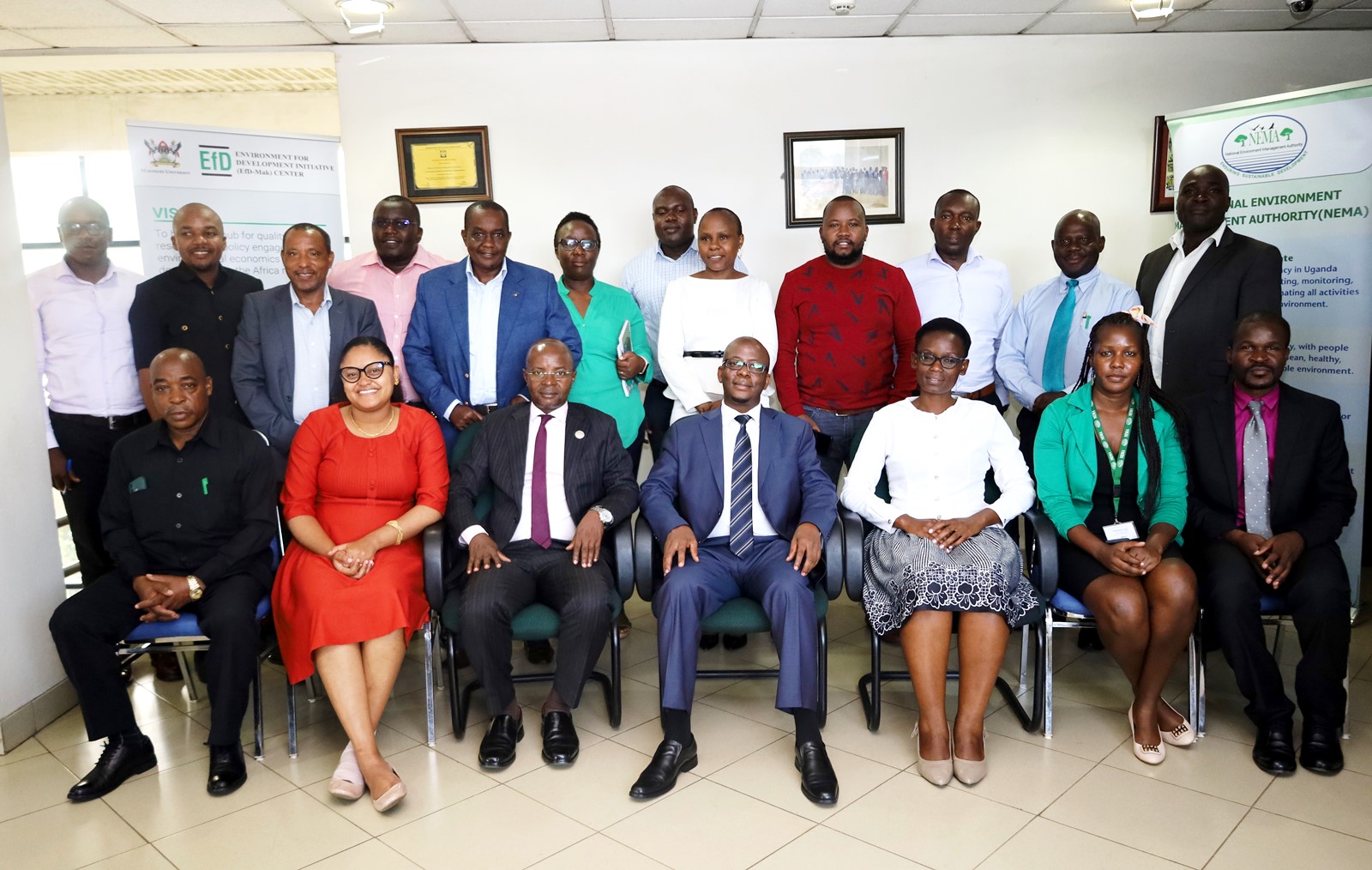
Lake Victoria is a trans-boundary natural resource, underpinning the economies and livelihoods of the population within the wider catchment area of Burundi, Kenya, Tanzania, Rwanda and Uganda. The most significant part of the Lake, 51%, is in Tanzania, occupying 35,088 Km. Uganda has 43% of the Lake, while Kenya has 6%.
The lake acts as a source of fresh water, fishing, a waste repository and provides food, energy, water for irrigation, industry, drinking, tourism within and cross border transportation.
However, the lake and its surrounding areas have faced many challenges including rising lake water levels, moving islands, encroachment, ecological and biodiversity degradation which is evident in the probable extinction of several fish species.
The violation of the buffer zone policy of 200 meters away from the lake by investors, industries, farmers and settlers, increasing pollutants in form of polythene bags, plastics and untreated wastes and poor fishing methods have changed the lake ecosystem.
East African governments are signatories to the regional and international treaties targeted at conserving, protecting and ensuring sustainable use of natural resources within the lake basin. Whereas the international treaties have been domesticated in national legislation and, institutions and agencies have been established with mandates to safeguard the fragile ecosystems, unstainable use and management of the lake basin persists. This is partly attributed to political interferences, ineffective monitoring and poor implementation of the existing laws on the management and utilization of the lake.
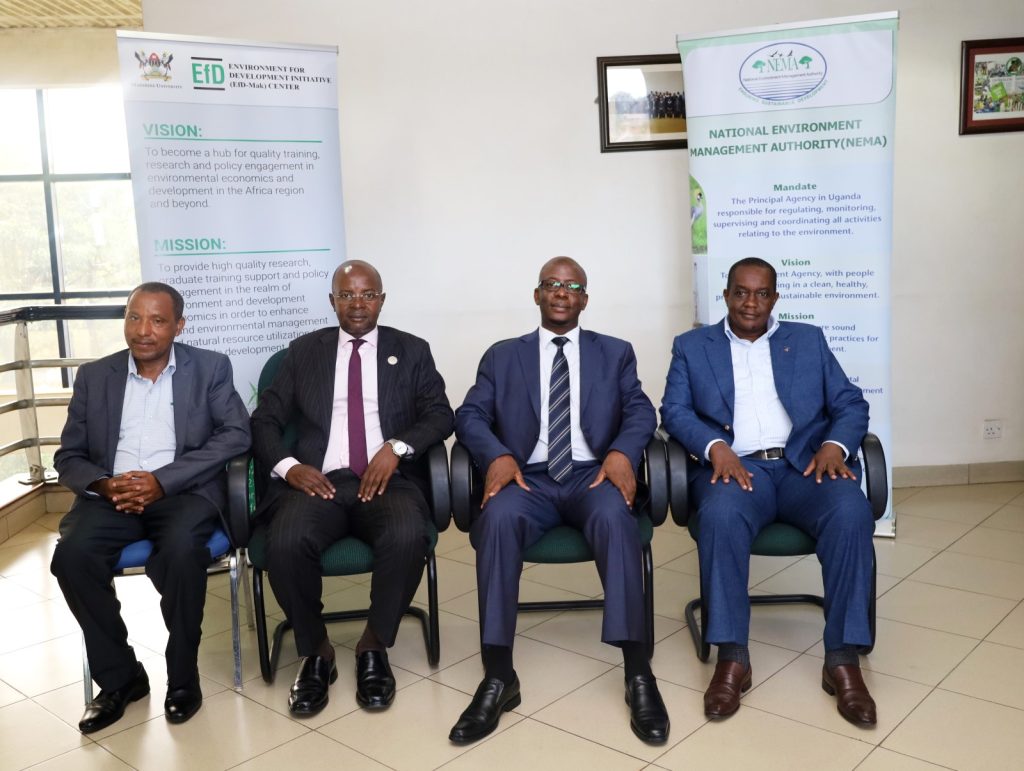
Because of unstainable management of the lake, countries have witnessed unprecedented consequences such as floods and mudslides, extreme and unpredictable weather changes including where dams could not generate electricity due to very low water level and many other livelihood, social and economic impacts including loss of lives.
East African EfD centers meet in Uganda to discuss LVB issues
On 7th June 2023, Environment for Development Initiative (EfD) Makerere University Uganda organized a one-day high level policy dialogue on changes of Lake Victoria’s hydrology, water quality and livelihoods that was hosted by Uganda’s environment watchdog – the National Environment Management Authority (NEMA) at its head office in Kampala, Uganda.
The dialogue was attended by the three East African EfD Centres led by the Directors; Prof. Richard Mulwa (EfD-Kenya), Dr. Onesmo Selejio (EfD Tanzania) and Prof. Edward Bbaale, for EfD-Uganda. Each country was represented by the delegates from different agencies. Among others, delegates from Kenya included Kenya Marine and Fisheries Research Institute (KMFRI), National Environment Management Authority (NEMA) of Kenya, Lake Basin Development Authority (LBDA) of Kenya and academia from the University of Nairobi. In Tanzania delegates spanned from Ministry of Livestock and Fisheries, Lake Victoria Basin, Mwanza, and other Academicians from Adhi University and University of Dar es Salaam. In Uganda, Delegates came from different agencies including Ministry of Finance, planning and Economic Development (MoFPED), National Planning Authority (NPA), Ministry of Water and Environment (MoWE), Ministry of Agriculture, Animal Industry and Fisheries (MAAIF), National Environment Management Authority (NEMA), Environmental Police Protection Unit (EPPU), and academicians from Makerere University.
The Executive Director NEMA and host of the dialogue Dr. Akankwasah Birerega also graced the meeting.
Each country presented an in-depth analysis of the issues around LVB pertinent to its areas of jurisdictions, and later went into plenary discussion where short, mid and long-term interventions were proposed
Giving the background to the meeting, the Director EfD-Mak center Prof. Edward Bbaale said the need for this meeting arose from the impacts Uganda felt in 2020 when the country experienced heavy rainfall that made the Lake Victoria Basin (LVB) unable to hold the water and caused a lot of havoc and predicaments on livelihoods.
During the period of late January 2020, fears of Lake Victoria bursting its banks started to be felt which later was followed by damaging of several landing sites and settlements as a result of floods. This led to disasters that left almost half a million people homeless and property worth billions of money had been lost in Uganda, Kenya and Tanzania.
In April 2020, heavy floods with the moving vegetation chocked the hydroelectric power generation turbines at Jinja on Lake Victoria leading to a total blackout of the entire nation during a presidential address to the nation.
As a center, Bbaale said, the EfD-Mak conducted an investigation on the cause and what Government of Uganda can do to circumvent some of the issues through conducting national wide policy tours and came up with a policy paper.
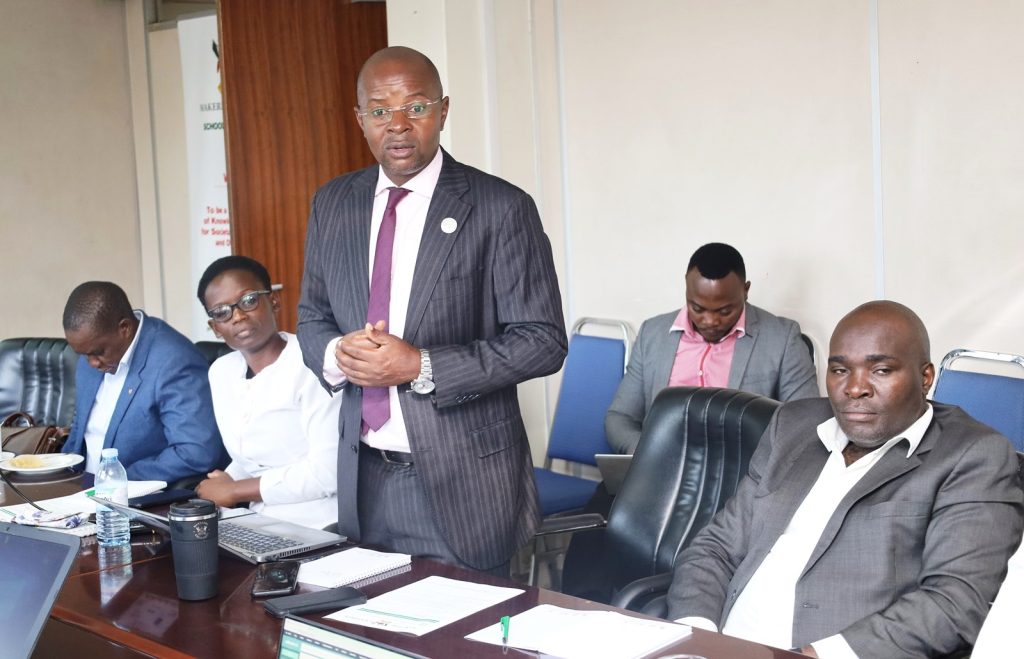
Bbaale attributed the 2020 floods to Climate change, Lake Sedimentation due to catchment degradation and Buffer zone encroachment and lack of Regional Consensus on a well-coordinated Policy of regulating Lake Victoria inflow and outflow
The Director however said it was noted that L. Victoria is a trans-boundary natural resource benefiting East African countries and a source of River Nile holding livelihoods in Egypt and Sudan and thus, what Uganda does was bound to affect other countries, hence the need for the East African EfD centers to converge and debate what they can do together in terms policy frameworks and to tap from one another’s best practices.
“The current problems may threaten Lake Victoria basin for centuries if not well addressed at present. For example, all the major lakeside cities in Uganda, Kenya and Tanzania could lose access to Lake Victoria in as little as 100 years.
We thought that we could leverage on each other’s information and knowledge on what we have collected concerning lake Victoria basin, come together, understand the issues from each country and how we can come up with one voice in the East African parliament and individual policy making bodies in our countries”, Said Bbaale
Bbaale reported that Environmental valuation in Uganda has huge capacity gaps. And more than often, environmentalists have vaguely responded to the president to weigh an industry over maintaining a wetland and many politicians have failed on the floor of parliament.
In addition to a deepened trans boundary cooperation on the management of the lake, tackling point and non-point source pollution, Bbaale called for the development of a coherent plan for conservation and rehabilitation of the fish fauna in Lake Victoria, strengthening capacity and human resources in environmental valuation as well as involvement of the general public in the management of the lake and observance of the buffer zone size of 200m away from the lake.
See the detailed EfD Mak presentation at the bottom of the page.
A cross-cutting enforcement body and an integrated Lake Victoria Basin Management policy for East Africa needed while producers must be responsible for their waste – Prof. Mulwa Kenya EfD Centre
The Director EfD-Kenya Prof Richard Mulwa decried the continued unsustainable utilization of natural resources despite many meetings targeting LVB. He said, the target for policy making on the lake basin and its ecosystem has been a moving target and would require a dynamic, adaptive, and collaborative approaches in balancing utilization and conservation.
Prof. Mulwa expressed the need for continued reviews and dialogues that incorporate the changing dynamics for example the changing climate.
At national level, Prof. Mulwa reported that Kenya has adopted integrated organic agriculture to reduce use of agrochemicals, promotes sustainable land use practices such as agro-forestry, crop rotation, conservation agriculture, and strives to eliminate the destructive fishing gears and enforcement of the allowable catch.
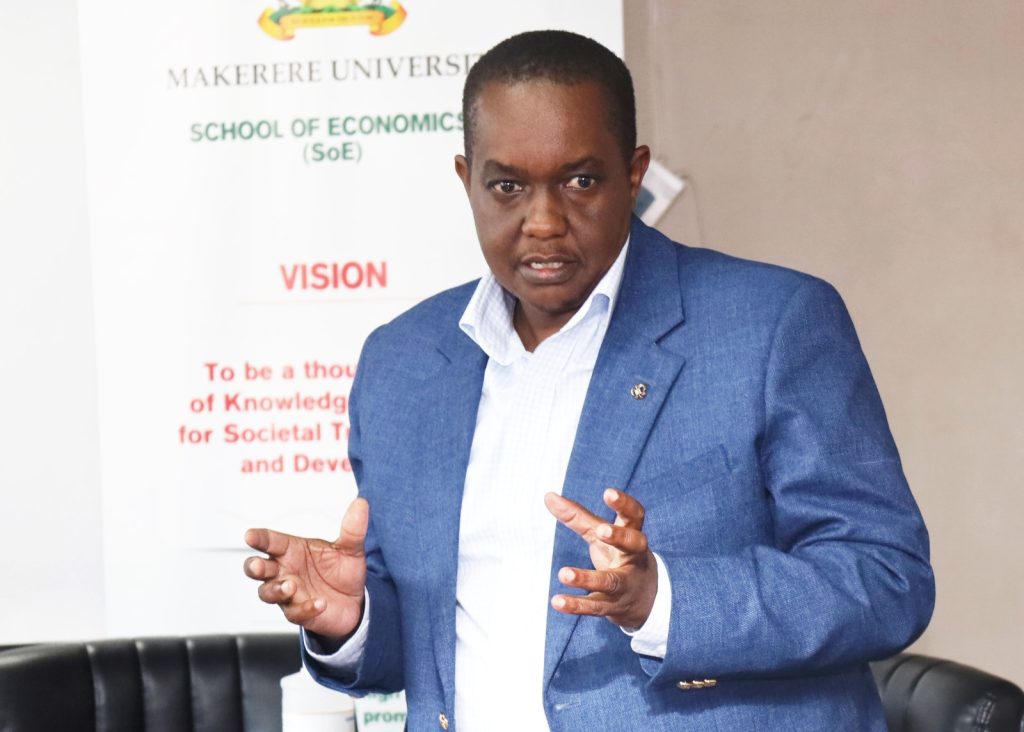
Other national interventions according to Prof. Mulwa are enhancement of waste management technologies and incorporation of the oil spills management plan and adoption of cleaner production technologies in industrial sector and mining sector, elimination of the use of cyanide and use the GDA (Gold Dressing Agent), Regulation of the aquaculture and develop MSP for suitability mapping , Promotion of conservation activities, integrating environmental considerations in County Integrated Development Plans including advocating and lobbying to expedite the enactment of many of the regulations that may govern activities in Lake Victoria that are still drafts.
Regionally, the Kenyan EfD Centre called for the Development of an integrated Lake Victoria Basin Management Policy/Regulation, formulation ofa regional monitoring commission under the East African CommunityandEnactment of draft regulations by the Lake Victoria Basin Commission (LVBC).
In addition to establishing an enforcing body that cuts across the five countries that share the resource, Prof Mulwa suggested that producers must be responsible for the waste they generate.
“Engage organizations on Extended Producer Responsibility (EPR) so each is responsible for waste collection and management around the basin and be able to care for the plastic bottles and how they are disposed’ He said.
See the detailed EfD Kenya presentation at the bottom of the page.
Declining water levels, water pollution and illegal fishing persistent challenges in Tanzania
Representing the Director EfD Tanzania, Dr. Rosemary Taylor said despite the immense contribution of the lake to many livelihoods, there is declining water levels due to evapotranspiration, given the Lake’s shallowness, poor land use practices, agricultural and industrial development, and water withdrawal for consumption.
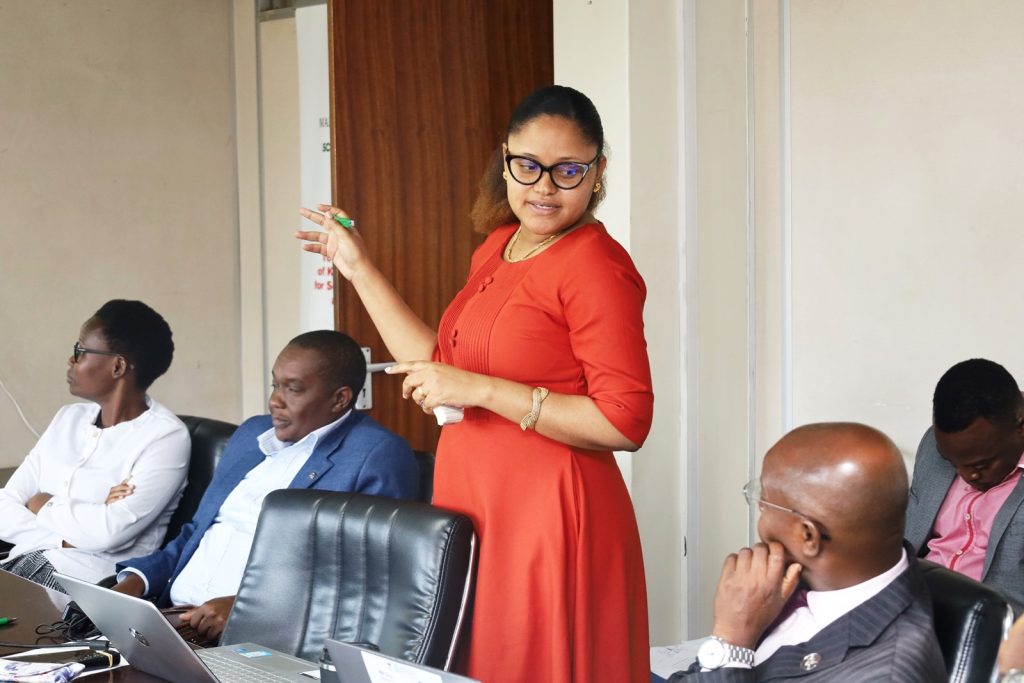
The other threat and defining features of the lake’s water according to Dr. Taylor is eutrophication, poor water visibility, dramatic changes in nutrients, and hypoxia, resulting to a massive loss of biodiversity.
The deteriorating water quality was attributed the discharge of untreated municipal waste, industrial effluents, urban surface contaminated runoff, organic and inorganic waste for intensive agricultural activities, and municipality sewage.
To promote the sustainable use of the basin, Dr. Taylor submitted that Government of Tanzania signed various protocols and treaties with other partner countries, participates in regional organizations such as LVFO, formulated national legal and regulatory framework and established national agencies to facilitate the sustainability of the Basin. GoT also collaborates with development partners in promoting sustainable use of the Basin, fosters Local community awareness creation and engagements, and
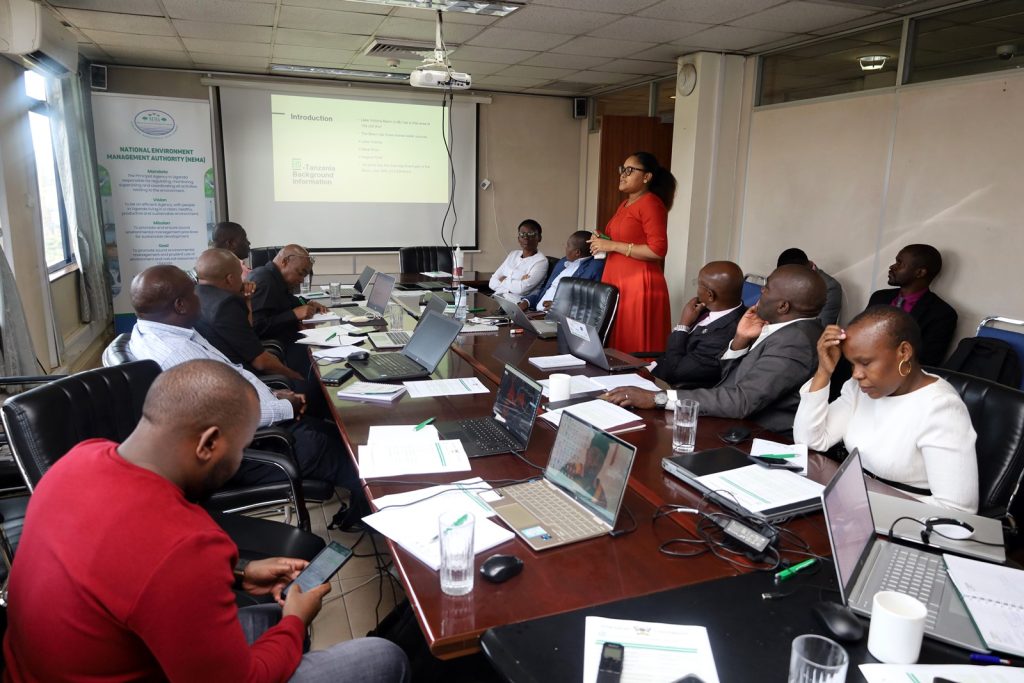
Increased women’s participation in managing the basin’s resources.
Dr. Taylor however said, despite being signatory to regional and international protocols , illegal fishing leading to reduced fish stocks and water pollution leading to loss of biodiversity are the persistent challenges
Key findings from the national policy dialogue attributed the persistent challenges to unharmonized policies e.g., Diverse policies and strategies about various sectors, such as agriculture, fisheries, water, and tourism, may have conflicting objectives.
Other factors are the Inadequate implementation and loopholes of the existing legal and regulatory frameworks, Lack of a common objective and vision among the key players, Growing poverty among the locals and limited alternative sources of living among local people and the open access nature of the fishing activities.
“Harmonizing regional and national Policies, Laws, and Regulations can help establish consistent frameworks for sustainable management.
We also need to think about enhancing economic empowerment of local communities and stakeholder engagement (academia, private sector, etc.) and involving local communities in decision-making can enhance awareness creation and a sense of ownership of the basin’s resources”, Dr. Taylor submitted
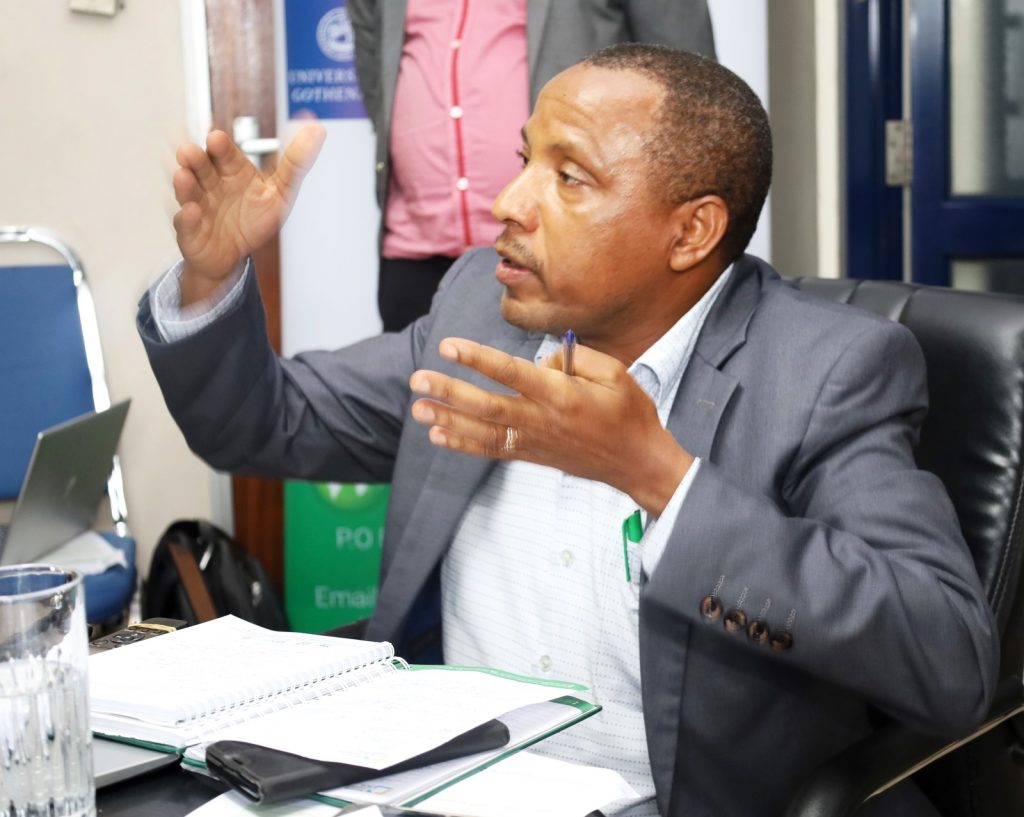
See the detailed EfD Tanzania presentation at the bottom of the page.
Expand the horizon of your economics and put the economic value on every resource, ED NEMA to EfD Centers
The Executive Director NEMA Dr. Akankwasah Birerega underscored the role of the EfD initiative as the way to go on reason that quiet often the obstacles of the environment come from development and thus one cannot separate environment from development and vice versa.
“Environment for development is a very important initiative for pushing sustainable policies advocacy and making a case for conservation using the economic lens because most of the decision makers understand the economic lens faster than the ecological lens.
When you translate ecological lens to the economic lens, it is the same message but it will move faster.
If you say this forest is very important for rainfall formation and air we breathe, everybody will take it for granted as the usual talk of environmentalists. But if you give them what cost they will incur when the forest goes away, the message will sin faster.
When you tell people that air pollution will increase public expenditure on health management, the message moves faster than saying the air is bad. So we need economics to communicate environment because the most policy architects and policies in Africa are based on economics”, Dr. Birerega explained
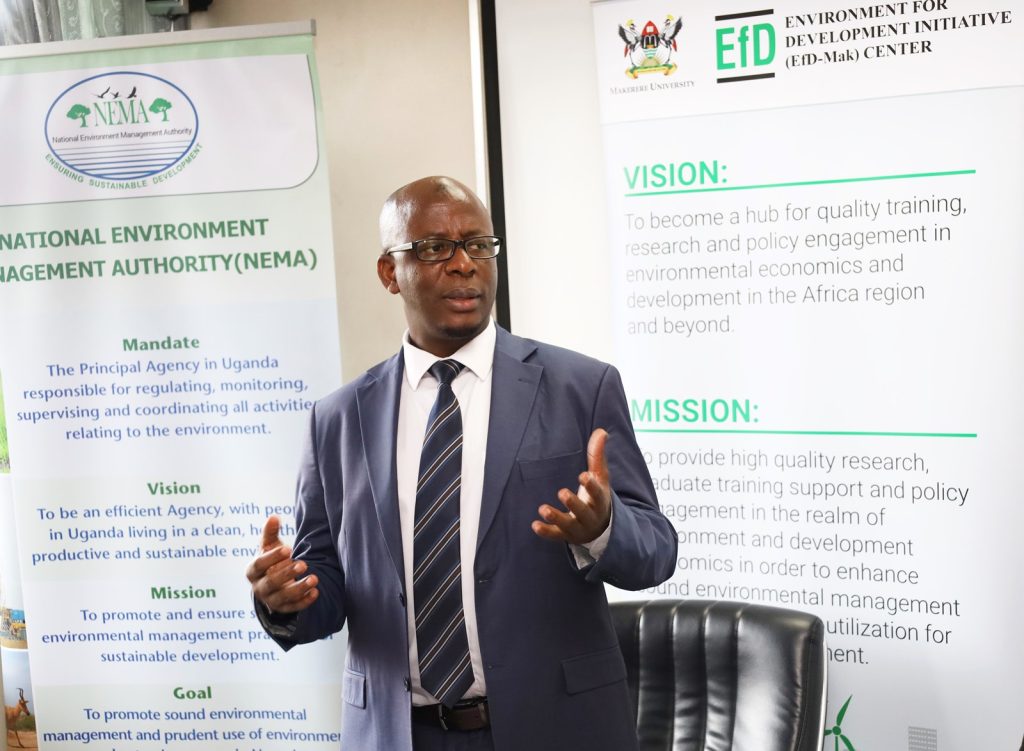
He urged the EfD centers to to use the niche, ability and establishment they have to lead the shift to enhancing the broadness with which economics is looked with by expanding the horizon of economics to begin putting the economic value on every resource in environment be it water, air, pollution etc.
“Economics for development is a very significant vehicle for us to transform the way we look at things and therefore as NEMA we pledge our total commitment to working with you in delivering the objectives of economics for environment sustainability and development because there are no alternatives to that.
You cannot preach the gospel of ecology alone and succeed because development must happen. We should not look at development as brick and mortar and concrete but in a holistic manner”, NEMAs ED asserted.
Dr. Birerega expressed willingness to participate in the development and popularization of the policy paper arising from this dialogue noting that nationally and globally there is now a fair understanding of the value of environment due climate change, biodiversity loss and increasing levels of pollution.
“It is clear that you cannot ignore environment issues and continue talking about development. We ignored environment, it went silent and started fighting for itself and when it starts fighting, it always wins and so our politicians now have a fair view of the importance of the environment at national and global level”, He added.
He expressed hope that they no longer go through a lot of hustle to convince people for environment resources, the reason why there is a Climate Financing Unit in Ministry Finance, Planning and Economic Development.
Short, midterm and long term propositions during the plenary discussions
- The need for further scientific studies into the issues affecting LVB.
- Have a database where information concerning the LVB can be maintained and looked at what happens 10 years ago to inform policy.
- Involvement of local communities in the management and protection of natural sciences as the users.
- Enhance capacity building in water science to monitor how the seas and lakes behave.
- Using science to inform policy frameworks and devise means to invoke governments to use science informed policies.
- Public participation in environmental related dialogues and utilization of local knowledge to protect the LVB and move away from academic ranks.
- Harmonization of policies on alternative livelihood alternatives to reduce dependence on nature eg price of electricity and Gas to reduce use of wood fuel.
- All policies must have the policy action in order to achieve the objectives.
- Governments should incentivize local communities to protect lake shores and curb illegal fishing.
- Emphasize ENR valuation and enforcement.
- Environmentalists should make arguments based on science to address environmental problems eg if sedimentation continues, for the next so years the lake will dry up, given the magnitude of pollution.
- Governments should adopt participatory approach to start from local communities to the ministries.
- Extend the mandate of the LVB to all East African water bodies including Burundi and Rwanda for better implementation.
- Revisit national policies on offering certificates for residential, hoteliers and industries in fragile ecosystems to avoid double standards.
- Address the issue of sedimentation to national leaders and point out that in countries like Chad, a lake disappeared.
- Make a case for Uganda’s Presidential directive banning charcoal use that it shows good political will. However, there is need to provide alternative survival mechanism for communities to succeed e.g. how affordable is LPG gas and electricity.
- Countries should form technical committees to visit other countries to learn the best practices.
- Discussion on LVB should be promoted around the East African level under the Natural Resources Commission to gain political will.
- Investing institutional capacity building to provide ENR Valuation.
- Gazeting wetlands and enhancing public awareness for enforcement to be successful.
- Think of mechanisms to win political will to fight selective enforcement of the law.
- Government should address the issue of sewerage systems and waste management near water sources and adopt sanitary dumping sites.
- Strengthening existing partnerships within the country and across boarders and borrow best practices from neighbors, and bring resources together.
- Need to devote efforts in financing chapter and resource mobilization beyond governments and donors for long term financing for LVB policy implementation and capacity building.
- Establish village committees to participate in project evaluation and check on performance indicators.
- Evoke the education system in the region to build real patriotism from primary on importance of natural resources and the need to preserve it for the next generation. Borrow from Germany the sense of ownership of natural resources. Most education level of the population fishing in East Africa is more concerned with making super normal profit not the health and future of the stocks.
- Institutional strengthening to enhance implementation of regional instruments to manage natural resources and Biodiversity.
It was agreed that a writing team is constituted to synthesize the research findings from the three countries and come up with a single document written in simple language that policy makers can easily appreciate.
Later on, members would convene virtually in a webinar and further synthesize that paper for use as a policy brief or advocacy tool for sharing with government entities.
Given the opportunity, the policy paper will be presented to committees of parliament and other stakeholders. At the same time, EfD Tanzania, residing in a country hosting the East African Parliament in Arusha, will seek an opportunity to articulate the issues in the East African Parliament to promote awareness on LVB, converse political support and inform policy making.
Jane Anyango is the Communication Officer, EfD-Mak Centre Uganda.
You may like
-


Celebrating Academic Excellence: CoBAMS Presents 975 Graduands at Mak 76th Graduation Ceremony
-
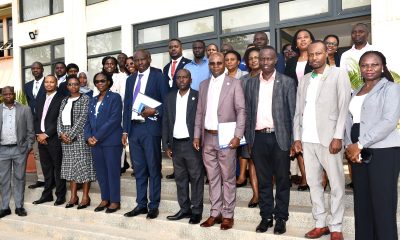

Parliament, MoFPD and Makerere Launch Five-Day Training on Integrated Macroeconomic Modelling to Strengthen Fiscal Oversight
-


Mak 76th Graduation Ceremony: CoNAS Presents 16 PhDs & Best Performing Male Student in the Sciences
-


Medical graduates urged to uphold Ethical values
-


CAES Presents Overall Best Performing Student in the Sciences & a Record 28 PhDs at the 76th Graduation Ceremony
-


Graduation marks the next phase of accountability, graduates told
Agriculture & Environment
CAES Presents Overall Best Performing Student in the Sciences & a Record 28 PhDs at the 76th Graduation Ceremony
Published
4 days agoon
February 25, 2026
The College of Agricultural and Environmental Sciences (CAES) presented the best performing student in the Sciences at the 76th Graduation Ceremony of Makerere University. Ms. Esther Ziribaggwa graduated with a CGPA of 4.77 in the Bachelor of Agricultural and Rural Innovation. She credits her success to resilience and hard work, despite the financial challenges she faced during her studies.
The four-day 76th graduation ceremony commenced on 24th February 2026 with the CAES, the College of Computing and Information Sciences (CoCIS), the College of Education and External Studies (CEES), and the School of Law presenting graduands for the award of degrees and diplomas of Makerere University.

CAES Graduation Statistics
CAES presented a total of 561 students (238 female and 323 male). Of these 28 (10 female and 18 male) graduated with PhD, 144 (68 female and 76 male) with Masters, 380 (157 female and 223 male) with Bachelor’s degrees, and 9 with Post graduate diplomas (3 female and 6 male). The PhD graduates included; Mr. Ainebyona Ronald Rwambuka, Ms. Amongi Winnyfred, Ms. Apil Jenifer, Mr. Asizua Denis, Mr. Astatke Dejene Kebede, Ms. Atuhairwe Privah, Ms. Ayesiga Stella Bigirwa, Mr. Biryomumaisho Dickson, Ms. Cherotich Harriet, Mr. Kalimunjaye Samuel, Ms. Kesiime Vasiter Eunice, Ms. Khakasa Elizabeth, Mr. Kimbowa George, Mr. Komi Gentle Wilson, Mr. Kusiima Kaheesi Samuel, Mr. Mathe Lukanda Musondolya, Mr. Mukama Innocent Hope Tinka, Mr. Mukengere Bagula Espoir, Mr. Nakhokho Evans Martin, Ms. Faridah Nalwanga Sendagire, Ms. Nalweyiso Amina, Ms. Nampijja Zainah, Ms. Njenga Peninah Wambui, Mr. Nkurunziza Gelase, Ms. Ojera Alal Ato Gertrude Miriam, Mr. Sebuliba Richard Mutumba, Mr. Shimali Fred, and Mr. Ssubi Allan Johnson.

Overall graduation Statistics
During the course of the 76th graduation ceremony, a total of 9,295 students will graduate with degrees and diplomas of Makerere University. Of these, 4,262 (46%) are female and 5,033 (54%) are male. A total of 213 students will graduate with PhDs, the highest number in the history of the University; 2,503 with Masters degrees; 6,343 with Bachelor’s degrees; 206 with postgraduate diplomas, and 30 with Diplomas.
Postgraduates constituted 31.4% of the total number of graduands.
Remarks by the Vice Chancellor
Addressing the congregation, the Vice Chancellor of Makerere University, Prof. Barnabas Nawangwe, congratulated the graduates on reaching this significant milestone. “You graduate today from one of the finest universities in the world,” he said. “You have distinguished yourselves through discipline, integrity, and academic excellence, and we are immensely proud of you. The qualifications you carry are vital to society. We have equipped you with the knowledge and skills to secure employment or to create enterprises that will, in turn, employ others. Should you not find immediate employment, do not despair, instead, reflect on the vast opportunities around you and rise to the challenge as entrepreneurs. Do not despise humble beginnings. To our PhD graduands, you now join the global community of scholars. Africa looks to you with great expectation. Use your expertise to transform our continent.”

He appreciated the parents and guardians for the sacrifices they made to support their children’s education.
New Research Excellence Recognition Plans
The Vice Chancellor informed the congregation that beginning with the 76th graduation ceremony, the University will recognize outstanding PhD students who are members of staff. He congratulated those who completed their doctoral studies in record time while continuing to serve without study leave, commending their resilience and leadership. “These will receive the Makerere PhD Resilience Award”.
Similarly, the University will henceforth honour the best PhD and Master’s theses, as selected by the Higher Degrees Committee of Senate. The students with the top 10 theses at the 76th graduation are: Kawesi Paul – MA Law (School of Law), Katende Stephen – MSc Quantitative Economics (COBAMS), Najjinda Shamirah – PhD Management (COBAMS), Turyahabwe Irene – MSc Molecular Biology (COVAB), Tayebwa Dickson – PhD (COVAB), Batte Herbert – PhD Mathematics (CONAS), Ssekago Arnold – MSc Mathematics (CONAS), Namiyingo Julian – PhD Literature (CHUSS), Namata Brenda – MSCO (CHUSS), and Tayebwa Asaph Kamau – MBA (MUBS).

Recognition of the CAES Research Output
In his remarks, the Vice Chancellor commended the College of Agricultural and Environmental Sciences for spearheading transformative research aimed at strengthening Africa’s food systems. Among the initiatives he highlighted was the Healthy Soy Project, funded by the Danish Ministry of Foreign Affairs, which seeks to develop sustainable, affordable, and nutritious soy-based foods to combat child stunting in Uganda and other climate-affected regions. He also cited a project focused on enhancing value addition in cocoa production through the development and scaling of a single fermentation box technology, now adopted by more than 70% of farmers in major cocoa-producing districts.

Efforts to Transform Makerere into a Research-led University
The Vice Chancellor noted that Makerere University continues to advance steadily toward becoming a truly research-led institution – one that generates knowledge to empower communities, strengthen industries, and drive national transformation.
He expressed gratitude to the Government of Uganda for entrusting the University with resources to support more than 1,400 high-impact research and innovation projects under the Makerere University Research and Innovations Fund (Mak-RIF). The Fund has enabled researchers to provide practical, evidence-based solutions in sectors including agriculture, land management, energy and minerals, peace and security, and education. Through Mak-RIF, over 200 PhD students have received support to pursue their research, many of whom are graduating at the 76th graduation ceremony.

The Vice Chancellor further highlighted the pivotal role of the Makerere University Technology and Innovations Centre (MUTIC) in advancing incubation and commercialization. “The Centre offers mentorship, business development training, intellectual property support, and industry linkages to help transform research outputs into viable enterprises. To date, eleven spin-off companies have been established by students and staff, while the University’s Innovation Pod (UniPod) has incubated more than 100 projects in the past year. The short-term target is to establish 50 spin-off companies annually, with plans to double that number in the long term.”
In partnership with the Science, Technology and Innovation Secretariat in the Office of the President, the University has also introduced awards to recognize outstanding researchers and innovators. “The Innovation Commercialization Award underscores the institution’s commitment to translating research into practical products, services, and technologies that address real-world challenges and support national development,” the Vice Chancellor noted.

Prof. Nawangwe appreciated the Government of Uganda for securing a USD 162 million loan from the Korea Exim Bank to support critical infrastructure development at the University. The funding will facilitate the construction of new facilities for the School of Medicine, School of Dentistry, School of Engineering, the Science and Technology Centre, and the completion of the School of Computing and Information Sciences- an unprecedented development in the University’s history.
He also thanked development partners who provide research grants and scholarships, including the MasterCard Foundation, European Union, Norwegian Agency for Development Cooperation, Swedish International Development Cooperation Agency, International Development Research Centre, Korea International Cooperation Agency, German Academic Exchange Service, National Institutes of Health, Centers for Disease Control and Prevention, United States Agency for International Development, Wellcome Trust, KfW, Inter-University Council for East Africa, Regional Universities Forum for Capacity Building in Agriculture, African Research Universities Alliance, the PLUS Alliance, the Worldwide Universities Network, the Association of African Universities, the Alliance for African Partnership, the Madhvani Foundation, and the Government of Uganda through the Higher Education Students Financing Board.

He further acknowledged the Embassy of China, the Chinese Chamber of Commerce, various government ministries, State House, and private sector partners – including Stanbic, Absa, NCBA, DFCU, and Centenary Bank-for their continued support.
Remarks by the Chancellor
In his remarks, the Chancellor, Hon. Dr. Crispus Kiyonga, appreciated the parents, guardians, and sponsors whose unwavering support enabled the students to succeed.
“At the heart of the graduands’ accomplishments are the professors, lecturers, and administrators of the University, ably supported by the University Council. It is only fitting that we acknowledge and commend them for a job well done,” he noted.

He further extended profound gratitude to H.E. Yoweri Kaguta Museveni and the NRM Government for the invaluable financial and other support extended to the University.
Going forward, he encouraged the University Administration to strengthen research funding, forge stronger partnerships with the private sector to commercialize innovations, deepen structured engagement with communities, and fully leverage the abundant technological resources available to the institution.
Message from the Minister of Education and Sports
The Minister of Education and Sports, also First Lady, Hon. Janet Kataaha Museveni, represented by Hon. Dr. Joyce Moriku Kaducu – Minister of State for Primary Education, commended the Vice Chancellor and the leadership of Makerere University for upholding the standards that continue to distinguish the University across Africa and beyond.

She expressed gratitude for the spirit of constructive collaboration among management, staff, students, and development partners, noting that such cooperation is vital for institutional growth and academic excellence. She paid special tribute to the University Council, particularly the Chairperson and its members, for their dedicated oversight and stewardship. Their commitment to transparency and good governance, she observed, has strengthened public confidence in this historic institution.
A major milestone highlighted by the Minister was the establishment of the Makerere University Research and Innovation Fund (RIF), which supports high-impact research aligned with national priorities and development goals. Through this initiative, thousands of researchers and innovators have developed practical, scalable solutions that are transforming communities and key sectors across Uganda.

She reaffirmed the Ministry’s commitment to strengthening higher education through expanded research funding, digital transformation, cultural reform, and stronger collaboration between academia and industry. “The vision is clear: universities must not only produce graduates, but also solution-makers and job creators”.
Implementing the Competence-based Education and Training
Reiterating a key directive from the Ministry of Education and Sports, she emphasized that all institutions of higher learning must prepare for the full implementation of Competence-Based Education and Training by July 2027. “This reform represents more than a policy shift. It signals a fundamental transformation in how graduates are prepared, with greater emphasis on practical skills, innovation, and problem-solving.”

She urged the Vice Chancellor and his team to lead in curriculum reform, staff development, and infrastructure enhancement to ensure the successful rollout of competence-based education.
The Minister further urged university management to ensure that all satellite campuses are fully accredited and that their programmes meet the same high standards of quality and relevance as those offered at the main campus. This, she stressed, is essential to safeguarding the integrity of the University’s degrees and effectively serving students nationwide.

Addressing the graduates, she noted that Uganda and Africa need innovators to modernize agriculture, engineers to build quality infrastructure, healthcare professionals to strengthen health systems, and educators to inspire future generations. “The world you are entering is dynamic, interconnected, and technologically driven. Artificial Intelligence is reshaping industries; climate change is redefining agriculture and urban planning; and global markets are transforming employment patterns. In this rapidly evolving landscape, you must remain adaptable, creative, and committed to lifelong learning.”
Address by the Commencement Speaker, Prof. Nicholas Ozor
In his address titled Knowledge with Purpose and Service with Integrity, the Commencement Speaker, Prof. Nicholas Ozor, Executive Director of the African Technology Policy Studies Network, urged the graduates to embrace lifelong learning, prioritize purpose over comfort, build character before career, and serve something greater than themselves. He encouraged them to believe in Africa and take action, rather than waiting for solutions from elsewhere.

Addressing the graduates of CAES, he emphasized that they stand at the intersection of survival and sustainability. “In a world confronting climate change, food insecurity, and environmental degradation, your knowledge is vital. You will work with farmers, ecosystems, land, water, and policy. You will shape food systems and livelihoods. Respect indigenous knowledge, embrace scientific innovation, and champion sustainability. The future of Africa depends on how well we feed our people and protect our land.”

Research Excellence and Innovation Commercialization Awards
During the graduation ceremony, Makerere University recognized the top researchers and innovators from the 10 Colleges. At CAES, Dr Mugabi Robert from the School of Food Technology and Nutrition received the Overall Top Researchers Award, 2026; Dr. Nalwanga Sendagire Faridah received the Best Early Career Researcher Award, Dr Mugabi Robert scooped the Mid-Career Research Award whereas Prof. Yazidhi Bamutaze got the Senior Career Research Award. Prof. Phinehas Tukamuhabwa, Dr Ephrahim Nuwamanya, Assoc. Prof. Ahamada Zziwa, and Dr Ssempijja John Edson were recognized among the best innovators.

More about Esther Ziribaggwa, the overall best performing student in the sciences:
Agriculture & Environment
Mak hosts First African Symposium on Natural Capital Accounting and Climate-Sensitive Macroeconomic Modelling
Published
1 week agoon
February 20, 2026
African economies are increasingly exposed to climate-related shocks that threaten development gains, fiscal sustainability, and macroeconomic stability. From extreme weather events and biodiversity loss to the depletion of natural capital, climate risks are reshaping economic realities across the continent. Yet many macroeconomic frameworks used in public finance and planning continue to overlook climate and nature-related risks and the long-term benefits of resilience and adaptation investments.
To address this emerging reality, over 250 participants from Africa, Europe and beyond, convened at Makerere University – Kampala, on the 12th and 13th of February 2026, to participate in the First African Symposium on Natural Capital Accounting and Climate-Sensitive Macroeconomic Modelling.
Following the theme, “Climate-Sensitive Macroeconomics: Rethinking Growth in Africa’s Natural Resource Base, the hybrid symposium organized by Makerere University through the Centre of Excellence for Africa Climate-Sensitive Macroeconomic Modelling (CEACM) within the School of Economics, under the College of Business and Management Sciences (CoBAMS), the Environment for Development Initiative (EfD), and the Ministry of Finance, Planning and Economic Development (MoFPED) in Uganda, brought onboard ministers, leading economists and planners, researchers, policy makers, the academia, development partners, climate change experts and the media.
The Symposium being the first of its kind on the continent, reflected Africa’s growing determination to work collectively in confronting shared development challenges, building on recent momentum such as the formation of Pan-African Finance Ministers Forum for Climate Action (PAFMCA).
Featuring speeches and presentations from notable speakers and partners, a keynote address on Natura Capital Accounting and Climate Change Nexus in Africa and their impact on Fiscal Policy, panel discussions, expert opinions, and exhibition kiosks (World Café), the symposium presented a platform to strengthen Africa’s analytical and institutional capacity to integrate climate and natural capital considerations into macroeconomic and fiscal policy.
Vice Chancellor underscores the role of universities
Welcoming the delegates to Makerere University, the Vice Chancellor-Prof. Barnabas Nawangwe emphasized that universities must lead innovation and collaborative research efforts to support collective climate change mitigation across the continent.
In the same vein, he advocated for strong collaboration between universities in Africa and government Ministries. “Makerere’s collaboration with the Ministry of Finance, Planning and Economic Development, stands as a shining example of how academia and government can strengthen economic management,” he said.

Prof. Nawangwe revealed that the collaboration between Makerere University and the Ministry, has strengthened macroeconomic modelling, fiscal policy analysis, and technical capacity within government. In addition, the partnership led to the establishment of the Centre of Excellence for Africa Climate-Sensitive Macroeconomic Modelling, bridging academic scholarship with real-world policy application.
“We have jointly established the Centre of Excellence for Africa Climate-Sensitive Macroeconomic Modelling. The Centre (established in August 2025) is anchored within the School of Economics in the Department of Policy and Development Economics, under the Master of Science in Economic Policy and Investment Modelling, a program jointly facilitated by Makerere University, the Ministry of Finance, Planning and Economic Development and the Bank of Uganda,” he mentioned.
Climate and Economic transformation are inseparable
The Vice Chancellor highlighted the critical intersection between economic transformation and environmental sustainability, noting that economies in Africa, heavily dependent on natural resources, face unprecedented pressures from climate shocks, biodiversity loss, and environmental degradation. Convinced that economic growth cannot be pursued in isolation from climate and environmental realities, he stressed the importance of integrating natural capital accounting and climate considerations into national development strategies.
Prof. Nawangwe advocated for shared responsibility of universities, research institutions, and policymakers to develop innovative analytical tools, responsive policy frameworks, and strong institutional capacities that promote sustainable growth while safeguarding environmental assets for future generations.
The Vice Chancellor commended UN PAGE and the Global Green Growth Institute (GGGI) for funding the symposium, as well as, other stakeholders namely the European Union and the Coalition of Finance Ministers for Climate Action (CoFMCA), Ministry of Water and Environment (MoWE), National Planning Authority (NPA), Uganda Bureau of Statistics (UBOS), the National Environment Management Authority (NEMA) for being reliable partners.
Integrating Climate into Fiscal Policy
During the opening ceremony, the Minister of Finance, Planning and Economic Development, Hon. Matia Kasaija underscored the urgency of embedding climate considerations into economic planning.
“As Ministers of Finance, we are often confronted with difficult trade-offs. Our task is to balance the needs of today with sustainability for future generations,” said Hon. Kasaija, in a speech read by Hon. Henry Musasizi, the Minister of State for Finance (General Duties).

The Minister guided that traditional macroeconomic models focusing only on growth, inflation, and fiscal balance are inadequate in an era of climate shocks. He affirmed that African economies are facing interconnected challenges which directly impact economic growth. He stressed that traditional macroeconomic frameworks must evolve to systematically incorporate environmental degradation and climate shocks, whose consequences can no longer be ignored in policy analysis.
“For countries such as Uganda, whose development prospects are closely linked to natural resources and the climate-sensitive sectors, these challenges are not abstract. They affect livelihoods, public finances and long-term economic resilience,” he mentioned.
The Minister emphasized that natural capital accounting and climate-sensitive macroeconomic modelling are vital for valuing natural assets, assessing environmental costs, and guiding sound investment decisions.
Protecting Africa’s Natural Capital
Hon. Beatrice Atim Anywar, Minister of State for Environment, emphasized the urgent need to protect Africa’s ecosystems. “Africa stands at a defining crossroads. Our economies remain anchored in natural capital—forests, water resources, biodiversity, land, and ecosystems—which sustain life, generate fiscal revenue, and underpin development,” she said.
She warned that climate-related shocks are already undermining growth and public investment. “Floods, droughts, land degradation, biodiversity loss, and water stress are no longer distant risks. They are present realities, already affecting productivity and macroeconomic stability,” she said.
She emphasized the need for improved economic models that account for environmental and climate risks: “Traditional macroeconomic frameworks have not adequately captured climate risks or the long-term economic benefits of resilience and adaptation. This limits our ability to make informed policy decisions as Africa pursues economic transformation, energy security, and fiscal stability,” she stated.
Hon. Anywar highlighted collaboration with GIZ, Makerere University, and government ministries, which led to the development of the MONCAP (Model for Natural Capital Policy Assessment). “This tool is being used to assess natural capital assets for climate change, energy transition, and their linkages to the macroeconomy. It supports budgeting by estimating the cost of depleted natural capital assets,” she said.
“Water security, forest conservation, ecosystem restoration, and climate adaptation are not costs. They are investments in Uganda’s long-term economic stability, productivity, and prosperity.”
Stakeholders urged to transform climate threats into opportunities
Adam Sparre Spliid, the Deputy Head of Mission, Danish Embassy said: “Integrating climate risk and natural capital into our macroeconomics frameworks is not only academic exercise, it is a massive de-risking strategy for private investment. By bridging the gap between government policy and planning, academia and research, and the private markets, we transform climate threats into tangible opportunities.”
Sustainability includes youth, jobs and human well-being
Dr. Steven Stone, Chair of the UN PAGE Management Board, emphasized that sustainability extends beyond the environment to encompass youth, jobs, economic growth, and human well-being. “While the environment is Africa’s foundational source of wealth, sustainable development requires balancing ecological stewardship with economic progress, including income and employment for the youth which are critical priorities for countries such as Uganda.”
Dr. Stone highlighted that UN PAGE, originating from the Rio+20 Conference, supports climate-sensitive economic policy in Africa, emphasizing that dialogue, scenario-building, cross-sector collaboration, and strong partnerships are key to advancing sustainable, inclusive, and climate-resilient development.
Africa’s Wealth Declining
In the keynote address titled, Natural Capital Accounting and Climate Change Nexus in Africa and their Impact on Fiscal Policy, Paul Jonathan Martin, Manager of Environmental Operations at the World Bank for Eastern and Southern Africa, and a specialist with over 30 years in climate and natural resources, warned that Africa’s overall wealth is under threat due to declining renewable natural capital.
“Produced capital has increased by 20%, human capital by a third, but renewable capital has declined by 30%,” Martin said. “When combined, Africa’s overall wealth trajectory has been weakening since 2010.”
He stressed that natural resources must be treated as economic assets requiring systematic accounting: “Africa’s rich natural resources are fundamental for sustainable development,” he said.
Citing examples from Ethiopia and Kenya, he highlighted successful integration of natural capital into public investment and budget decisions. “In Ethiopia, there are payments for ecosystems and investment prioritization tools. In Kenya, natural capital accounting integration into budgets has strengthened public investments. Climate change has deep, cascading effects across sectors, but Africa has major potential to lead climate solutions,” he said.

Martin also highlighted the economic benefits of climate adaptation: “From 2020–2050, the cumulative effect of adaptation on Uganda’s GDP is positive. Without action, under a dry/hot climate future, GDP could significantly deviate from projected growth paths.”
Drawing on insights from over 70 country climate and development reports produced by the World Bank, the keynote speaker highlighted the profound macroeconomic impacts of climate change across Africa. He stressed the importance of integrating climate and natural capital into macroeconomic planning. He noted that Africa’s forests, water systems, and biodiversity are vital for sustainable development but face growing threats from climate change, environmental degradation, and climate-related disasters that undermine productivity, public investment, and economic stability.
He observed that traditional macroeconomic models often fail to capture the value of natural assets and regulating ecosystem services, which are critical to both economic stability and resilience but are largely excluded from GDP calculations.
Africa-Led Solutions
Prof. Edward Bbaale, Principal, College of Business and Management Sciences (CoBAMS), stressed the importance of developing African-led solutions. “We need to champion the Africa-led model. We need approaches that fit our unique context. Africa is not here to take in other frameworks blindly,” he said.
By supporting research, training, policy dialogue and modelling innovation, the Centre of Excellence for Africa Climate Sensitive Macroeconomic Modelling (CEACM) positions Makerere University as a regional hub for advancing climate-sensitive macroeconomic policy across Africa.
He highlighted CEACM’s capacity-building programs: “Our goal is to ensure African Ministries of Finance have home-grown expertise to integrate climate and natural capital considerations into fiscal and macroeconomic policy. This is critical for long-term resilience and sustainable development,” he said.
The Principal explained that establishment of independent research centres enables Makerere University to go beyond traditional academic instruction and focus deeply on societal challenges, particularly those related to climate change, environmental degradation, and biodiversity loss.

He reported that the Centre of Excellence for Africa Climate-Sensitive Macroeconomic Modelling is structured to advance methodological innovation, develop new data systems, and strengthen climate-sensitive macroeconomic tools that are tailored to the African context.
MONCAP Model for Policy Assessment
Dr. Peter Babyenda, a member of faculty at CoBAMS, demonstrated MONCAP (Model for Natural Capital Policy Assessment), which integrates climate and natural capital variables into fiscal and macroeconomic planning.
“MONCAP allows policymakers to estimate the economic cost of depleting natural assets such as forests, wetlands, and water resources. It helps simulate policy options and determine how investments in natural capital yield long-term benefits,” Babyenda said. “We came up with this model to aid the Ministry of Water and Environment. This model is open—you can extend it,” he added.

He highlighted capacity-building initiatives, including short courses and the Master of Science in Macroeconomic and Investment Modelling, designed to train economists to incorporate natural capital and climate into policy planning.
International Perspectives
Sweetman Liam, Ireland’s Finance Minister, highlighted the economic value of ecosystems: “There is a deeper value of landscapes in flood prevention and biodiversity. Decision-making was informed, and people started understanding economic value,” he said.
Prof. Chukwuone Nnaemeka of the University of Nigeria emphasized collaboration with national statistical agencies: “We coordinate with the National Bureau of Statistics to develop natural capital accounting metrics. Increase the use of Natural Capital Accounting in decision-making,” he stated.
Technical and Parallel Sessions
The afternoon session featured three parallel sessions focusing on Natural Capital Accounting Methodologies and Best Practices, Climate-Sensitive Fiscal and Economic Modelling, and Natural Capital Accounting and Model Uptake and Use.
Drawing on diverse expertise, the panels highlighted innovative approaches and demonstrated that natural capital is not an environmental afterthought, but a central pillar of sustainable economic and policy planning.
The first day of the African Symposium drew to a close with interactive exhibitions at the World Café, where case studies and practical demonstrations highlighted innovative approaches to integrating climate and natural capital into economic planning. Participants actively engaged in discussions and networking, forging collaborations that promise to advance climate-sensitive fiscal and development strategies across Africa, setting a strong and optimistic tone for the days ahead.
Agriculture & Environment
Uganda Martyrs Namugongo Students Turn Organic Waste into Soap in an Innovative School Project on Sustainable Waste Management
Published
1 week agoon
February 20, 2026
*****The students were supervised by researchers from the College of Agricultural and Environmental Sciences (CAES) at Makerere University, led by Prof. Fred Kabi.
The garbage challenge
With urbanization rates rising rapidly across Uganda, municipal solid garbage generation in the country’s cities is projected to increase by more than 40 percent by 2050. The growing burden of unmanaged garbage, particularly organic garbage, continues to pose environmental and public health risks, underscoring the urgent need for innovative and sustainable solutions.
It is against this backdrop that Senior Four students of Uganda Martyrs Secondary School Namugongo undertook a project to demonstrate how local market garbage challenges can be transformed into opportunities for sustainable development.

Addressing the garbage Challenge
As part of their academic project under the competence-based curriculum, the students were tasked with identifying real-world challenges within their communities and developing practical solutions using locally available resources. Through research and field observations, they identified poor garbage management, particularly the accumulation of organic waste at major dumping sites such as Kiteezi Landfill, as a critical issue.
At these sites, unsorted solid garbage often accumulates uncontrollably, sometimes leading to collapses that pose serious environmental and public health risks including water contamination by leachates, persistent foul odors, and disease outbreaks.

Rather than solely viewing solid market garbage as a problem, the students recognized its untapped potential within the biodegradable fraction of market garbage streams. Their innovative solution was to convert organic solid market waste (biodegradable garbage) into an industrial raw material for soap production by utilizing saprophagous Black Soldier Fly larvae (BSFL) to accumulate lipids and applying the scientific process of saponification.
Makerere University Support to the project
The students’ project was supervised by Prof. Fred Kabi together with technicians from the College of Agricultural and Environmental Sciences (CAES) at Makerere University. Prof. Kabi and his team have been actively researching on Black Soldier Fly Larvae (BSFL) as a bio-waste management technology capable of converting biodegradable solid municipal garbage and farm waste into valuable by-products such as organic fertilizers, animal feeds, soap, and biodiesel.
Working in collaboration with Ento Organic Farm Uganda Ltd, the researchers have demonstrated how insect-based waste conversion systems can support a circular economy by transforming biodegradable waste into industrial raw materials.

According to Prof. Kabi, the five young garbage entrepreneurs (students) began their project by collecting information on household garbage management practices. After analyzing the data, they engaged stakeholders along the garbage value chain to brainstorm all-inclusive, source-based waste management strategies.
“The students developed a solution that links efficient waste management at garbage generation source to support production of organic fertilizer, insect protein for animal feeds, and soap, which is only possible with biodegradable garbage,” Prof. Kabi explained. “This approach of the Competence Based Curriculum (CBC) for lower secondary schools supports the concept of taking Makerere University to the community of budding scientists while promoting sustainable community development through a circular economy.”
From Market Waste to Soap Bars
The Team leader, Ms. Ivy Stephanie Kitali explained the step-by-step scientific process behind the project. The students began by collecting organic waste from local markets, which was then shredded to prepare it for the larvae as a substrate. “Black Soldier Fly larvae were then introduced to the prepared waste. The larvae efficiently consumed the organic matter, greatly reducing its volume while accumulating lipids (fats) in their bodies. After maturation, we separated the larvae from the remaining waste, euthanized through blanching and dried it. Oil was then extracted from the dried larvae using ethanol as a solvent. This lipid-rich oil became the primary ingredient or raw material for soap production. To enhance the final product, the larvae oil was blended with minute quantity of sunflower oil before adding sodium hydroxide, initiating saponification, the chemical reaction that transforms fats and oils into soap,” she explained. The process ultimately yielded usable bars of soap derived entirely from what had once been discarded as unwanted market waste/garbage.

Building Skills and Sustainable Innovation
Beyond producing soap, the project provided students with hands-on training in scientific research, waste management techniques, bio-chemistry, and sustainable innovation. They gained practical exposure to insect-based biotechnology and learned how environmental challenges can be addressed through science-driven by entrepreneurship.
Trending
-

 Humanities & Social Sciences6 days ago
Humanities & Social Sciences6 days agoMeet Najjuka Whitney, The Girl Who Missed Law and Found Her Voice
-

 General5 days ago
General5 days ago76th Graduation Highlights
-

 Health2 weeks ago
Health2 weeks agoUganda has until 2030 to end Open Defecation as Ntaro’s PhD Examines Kabale’s Progress
-

 Agriculture & Environment1 week ago
Agriculture & Environment1 week agoUganda Martyrs Namugongo Students Turn Organic Waste into Soap in an Innovative School Project on Sustainable Waste Management
-

 General2 weeks ago
General2 weeks agoMastercard Foundation Scholars embrace and honour their rich cultural diversity
